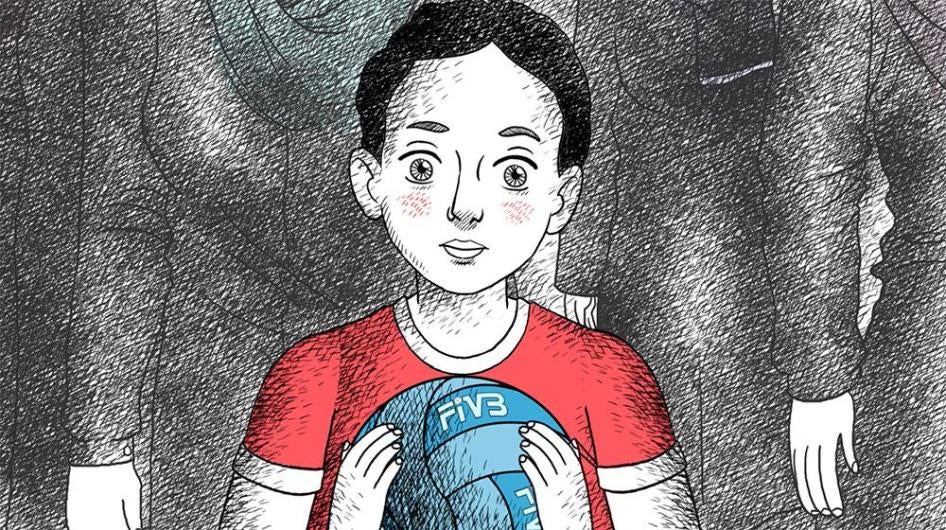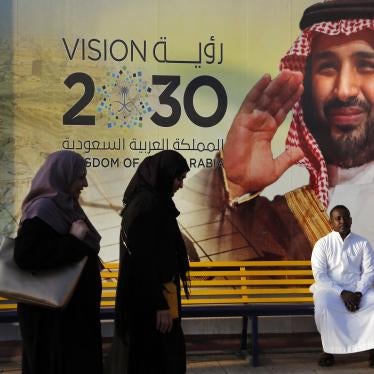(Lausanne) – The International Volleyball Federation (FIVB) can and should use its leverage with Iran to seek an end to the discriminatory ban on women and girls attending volleyball matches in Iran, Human Rights Watch said, after a meeting with the FIVB in Lausanne.
In October, the FIVB awarded Iran a February 2016 beach volleyball World Tour tournament, a first for the country. Iran will also host the June 2016 World League tournament—two opportunities to allow women to attend.
“The FIVB says it is committed to gender equality, but so far their policies haven’t worked —only men could buy tickets for their tournament in Iran last June, and hardliners threatened women,” said Minky Worden, director of global initiatives. “The FIVB can and should make sure it is not cost-free for Iran if it keeps excluding women.”
The FIVB, in a statement to Human Rights Watch, affirmed its concern about the exclusion of women from stadiums, and said it is working to address this discrimination. However, the FIVB should escalate its efforts so that women can return to stadiums, Human Rights Watch said.
Among other types of gender discrimination women face in Iran, they are barred from entering sport stadiums, including to watch men’s volleyball matches. In October, Human Rights Watch began a digital advocacy campaign, #Watch4Women, which seeks to end this ban and more broadly to strengthen respect for women’s rights in Iran, in line with international human rights standards and the Olympic Charter.
Women were able to attend volleyball matches until 2012. The ban on women violates the “Fourth Fundamental Principle” – on nondiscrimination – of the FIVB’s own constitution, Human Rights Watch said.
Human Rights Watch has asked the FIVB to take the following steps:
- Publicly state its support for an end to the 2012 ban on women attending volleyball matches and other tournaments in sports stadiums;
- Urge Iranian authorities to repeal the ban, prior to the FIVB beach volleyball tournament in February and the World League matches in June 2016;
- Ask Iranian volleyball officials to announce publicly how women can buy tickets online and attend these matches; and
- Request that Iranian police protect women who attend volleyball matches, instead of deploying them to arrest and drive off women, as has been the case in the past.
Rebutting the FIVB’s claim that the #Watch4Women campaign is calling for a boycott of volleyball games in Iran, Human Rights Watch said that the objective is to end such blatant discrimination against women and girls, and that it is the Iranian authorities who are enforcing a “boycott” on female spectators. The ban is not just opposed by women’s rights activists, but also by many reformists in the country.
By playing a key role in ending Iran’s discriminatory ban, the FIVB could follow the path of the International Olympic Committee (IOC), which adopted its reform “Olympic Agenda 2020” last December. A central pillar of the reforms is gender equality.
The FIVB statement reads:
The FIVB had a very productive meeting with Human Rights Watch this week, where the FIVB asked Human Rights Watch to work together to strive for gender equality in Iran since there is an issue of not only local women not being able to attend men’s volleyball matches but also men not being able to attend women’s volleyball matches.
The FIVB has made significant progress working closely with local authorities in trying to improve the situation in Iran with families being able to attend volleyball matches a key aim and believes that with the help of Human Rights Watch, further headway can be made.
The FIVB recently launched its 9 Goals project, which coincides with the IOC’s Agenda 2020 objectives, and a key part of the project is to make volleyball the No 1 family sport entertainment in the world. Allowing families to attend volleyball matches in Iran is an important component of this.
"The FIVB can't lay claim to gender equality so long as they allow Iran to exclude women," Worden said.
Human Rights Watch urged the FIVB to act swiftly, to secure a repeal of the ban ahead of the beach volleyball tournament in Iran, just weeks before International Women’s Day on March 8, and months before the Rio Olympics.
The FIVB should say publicly —as has FIFA concerning football—that if Iranians want to host tournaments in 2017, they must repeal ban on women now, Human Rights Watch said.
“The FIVB should draw a line in the sand, to make clear its mission is to stand with women, not with those repressing them,” Worden said. “Volleyball tournaments in Iran should be enjoyed by men and women alike.”








